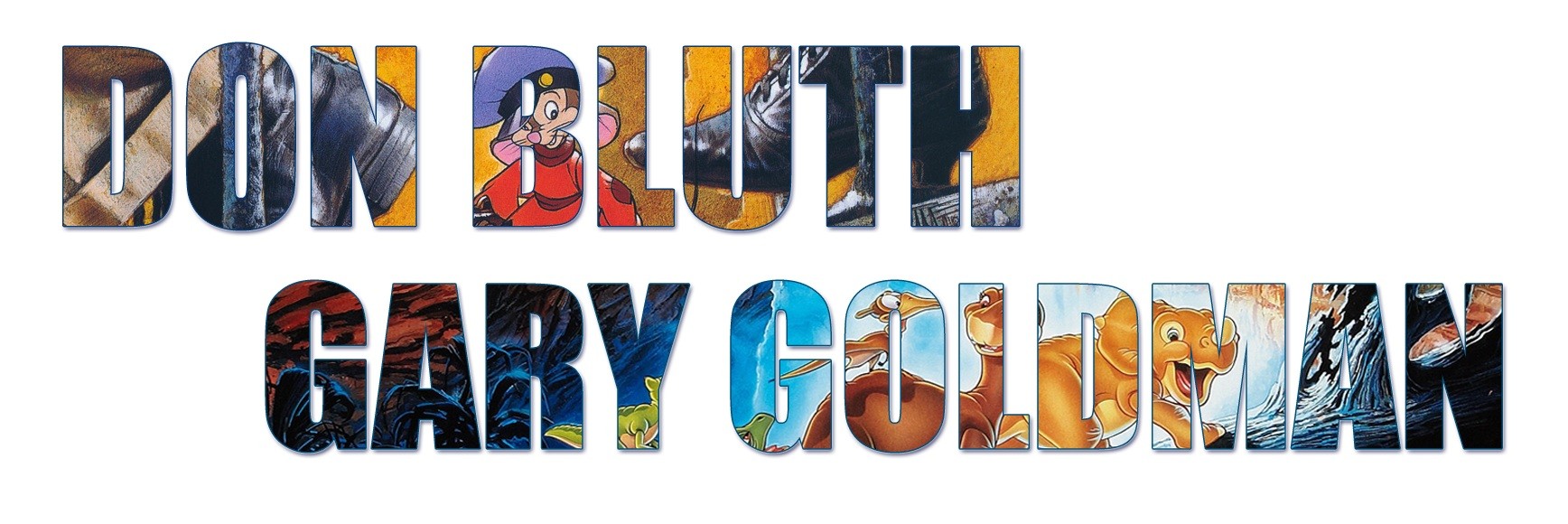

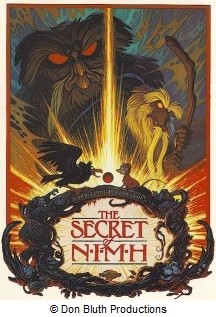 At that meeting he commented, "I thought this style of animation had died with Walt Disney in the '60s." His enthusiasm for the film's story, animation and soundtrack caused him to invite us to collaborate on an animated film. Almost exactly two years later, in December of 1984, Steven called to let us know that he thought he had found a good property for us to produce. Then when we were developing An American Tail, early in 1985, we agreed that we would use Jerry Goldsmith as its musical composer. We even had a meeting with Steven and Jerry at Steven's new Amblin offices, on the Universal backlot. About two weeks after that meeting, Jerry called a second meeting. A meeting to apologize for accepting the assignment. At that meeting he revealed that he had spoken to his agent, who informed him that his composing schedule for the 1986 release was too full to accommodate writing the score for An American Tail. After Jerry left the meeting, we immediately began talking about James Horner's work and agreed that we should approach him. Strange, but back in 1981, right after we had commissioned Jerry to do The Secret Of NIMH, James' agent, Michael Gorfaine, called us and asked if we would accept a tape of James Horner's sample music to consider him to do the score for our film. I told him that we had already contracted Jerry Goldsmith. The agent countered with, "Jamie is the next Jerry Goldsmith, and a lot more economical." He sent the tape over to our studio and we listened to it. The Mr. Gorfaine was right. James Horner is extremely talented. However, we had sealed the deal with Jerry.
At that meeting he commented, "I thought this style of animation had died with Walt Disney in the '60s." His enthusiasm for the film's story, animation and soundtrack caused him to invite us to collaborate on an animated film. Almost exactly two years later, in December of 1984, Steven called to let us know that he thought he had found a good property for us to produce. Then when we were developing An American Tail, early in 1985, we agreed that we would use Jerry Goldsmith as its musical composer. We even had a meeting with Steven and Jerry at Steven's new Amblin offices, on the Universal backlot. About two weeks after that meeting, Jerry called a second meeting. A meeting to apologize for accepting the assignment. At that meeting he revealed that he had spoken to his agent, who informed him that his composing schedule for the 1986 release was too full to accommodate writing the score for An American Tail. After Jerry left the meeting, we immediately began talking about James Horner's work and agreed that we should approach him. Strange, but back in 1981, right after we had commissioned Jerry to do The Secret Of NIMH, James' agent, Michael Gorfaine, called us and asked if we would accept a tape of James Horner's sample music to consider him to do the score for our film. I told him that we had already contracted Jerry Goldsmith. The agent countered with, "Jamie is the next Jerry Goldsmith, and a lot more economical." He sent the tape over to our studio and we listened to it. The Mr. Gorfaine was right. James Horner is extremely talented. However, we had sealed the deal with Jerry.
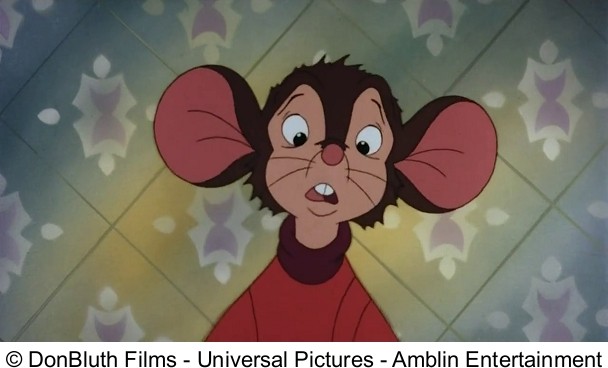 Don Bluth: When we "spotted" music for the picture in Steven's editing room, we talked about instruments and themes for each of the main characters. I usually select temporary tracking music (from LP records of various film scores). Many of the selections were from his own film scores, and from the work of John Williams, Jerry Goldsmith, Ennio Morricone, Korngold and others. I would also verbalize what feeling we were seeking for each sequence in the film. I'm sure he knew what to do without my input, but that is the reason for music 'spotting' sessions. It is to allow a collaboration and for the composer to hear what the producers and director have in mind as the story unfolds.
Don Bluth: When we "spotted" music for the picture in Steven's editing room, we talked about instruments and themes for each of the main characters. I usually select temporary tracking music (from LP records of various film scores). Many of the selections were from his own film scores, and from the work of John Williams, Jerry Goldsmith, Ennio Morricone, Korngold and others. I would also verbalize what feeling we were seeking for each sequence in the film. I'm sure he knew what to do without my input, but that is the reason for music 'spotting' sessions. It is to allow a collaboration and for the composer to hear what the producers and director have in mind as the story unfolds.
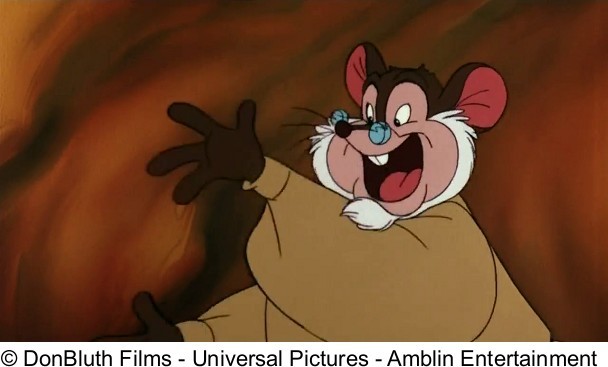 Don Bluth: James is very sensitive, creative and intuitive. As we ran the workprint of the film with dialogue and temp music, some questions would arise. The idea of writing character themes with which to identify each character and perhaps which instrument might best describe the personality of each character is not new to composing for film. It is even more prevalent in animated films. I have some background in music, so I think James and I were speaking the same language. Those elements were developed and agreed to during the spotting sessions. Of course, once James went to his own music room, it blossomed into what became a beautiful score.
Don Bluth: James is very sensitive, creative and intuitive. As we ran the workprint of the film with dialogue and temp music, some questions would arise. The idea of writing character themes with which to identify each character and perhaps which instrument might best describe the personality of each character is not new to composing for film. It is even more prevalent in animated films. I have some background in music, so I think James and I were speaking the same language. Those elements were developed and agreed to during the spotting sessions. Of course, once James went to his own music room, it blossomed into what became a beautiful score.
Regarding the songs in An American Tail : can you tell us about the creation process of them?
Don Bluth: For the songs, Amblin brought in Barry Mann & Cynthia Weil, a songwriting duo whom had a long list of hit songs. We had to choose and agree where songs would be appropriate to entertain as well as not stop the story. 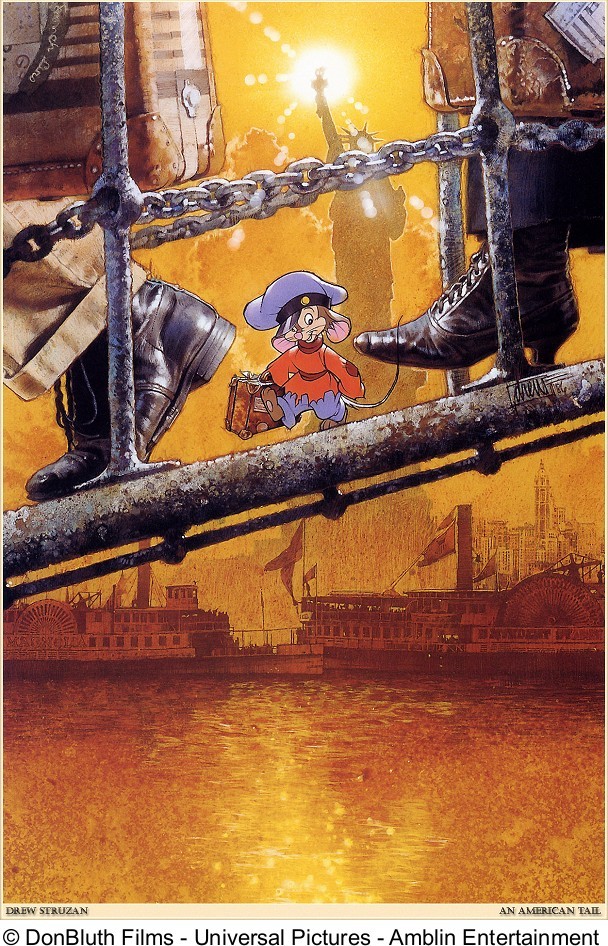 The discussions we had drove the point that the lyrics must move the story forward or help describe the characters’ personalities. Cynthia and Barry would work together with James to write: There Are No Cats in America, Never Say Never, Somewhere Out There and A Duo. Barry and James came up with the melody and Cynthia scribed the lyrics. The first time we met, we discussed the sections of the script where we would insert songs. Each song situation was different, Somewhere Out There was to show that Fievel and his sister Tanya loved and missed one another. Unbeknownst to them, they were both in the same city but did not know where the other was. Never Say Never was for a moment between Henri, the French pigeon, who finds little Fievel on Ellis Island, where the erection of the Statue of Liberty is taking place, and where Fievel has landed in America. He had been separated from his family. He is sad and feels he'll never find them. Henri raises Fievel's spirits with this Never-Say-Never song. There Are No Cats In America was to reinforce the belief that there were no cats in the new world. The Cats in Russia were a symbol of the oppression they endured in Mother Russia. The song was about their hope for freedom from oppression. The song would be sung by many of the migrant mice expressing the experiences that troubled them but that their futures were bright in America without cats!. Similar discussions applied to "A Duo" when Fievel and the not-so-fierce cat, Tiger, meet and discover they have many 'likes' and 'dislikes' in common. By the end of the song they become buddies.
The discussions we had drove the point that the lyrics must move the story forward or help describe the characters’ personalities. Cynthia and Barry would work together with James to write: There Are No Cats in America, Never Say Never, Somewhere Out There and A Duo. Barry and James came up with the melody and Cynthia scribed the lyrics. The first time we met, we discussed the sections of the script where we would insert songs. Each song situation was different, Somewhere Out There was to show that Fievel and his sister Tanya loved and missed one another. Unbeknownst to them, they were both in the same city but did not know where the other was. Never Say Never was for a moment between Henri, the French pigeon, who finds little Fievel on Ellis Island, where the erection of the Statue of Liberty is taking place, and where Fievel has landed in America. He had been separated from his family. He is sad and feels he'll never find them. Henri raises Fievel's spirits with this Never-Say-Never song. There Are No Cats In America was to reinforce the belief that there were no cats in the new world. The Cats in Russia were a symbol of the oppression they endured in Mother Russia. The song was about their hope for freedom from oppression. The song would be sung by many of the migrant mice expressing the experiences that troubled them but that their futures were bright in America without cats!. Similar discussions applied to "A Duo" when Fievel and the not-so-fierce cat, Tiger, meet and discover they have many 'likes' and 'dislikes' in common. By the end of the song they become buddies.
After a few weeks, we met again with the songwriters. This time James, Cynthia and Barry were there to perform Somewhere Out There and There Are No Cats in America. The songs weren't polished. It was just an audition of the songs, a performance with James playing the piano and Cynthia, James and Barry singing. There were no negative comments on either song. Actually, Somewhere Out There received immediate accolades from all of us – we all loved the song. There were even comments from Steven that he thought the song could hit the pop charts.
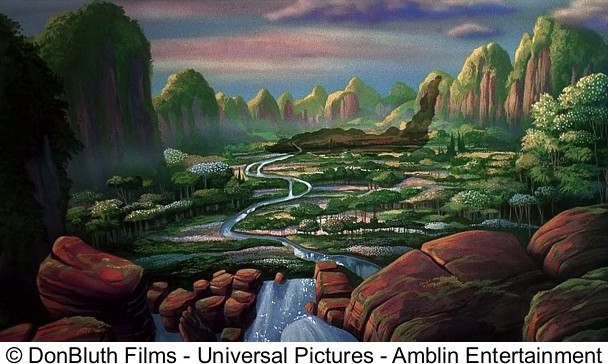 Gary Goldman: The names of those great composers are all very familiar to James and he can definitely weave a magical music wand over a blank music score sheet. The score for The Land Before Time paints the film's emotional moments beautifully. We couldn't be prouder.
Gary Goldman: The names of those great composers are all very familiar to James and he can definitely weave a magical music wand over a blank music score sheet. The score for The Land Before Time paints the film's emotional moments beautifully. We couldn't be prouder.
How is that humanly possible to write such a huge symphony (90 minutes of music I guess this was?) in such a short time?
Gary Goldman: Well, firstly The Land BeforeTime didn't have wall-to-wall under-score, nor was it a ninety minute film. We originally planned for film to be 82 minutes in length, however, it endured several cuts or edits cutting the length down to around 73 minutes before we "spotted" the film for music with James and Steven (Spielberg). The film's final length was 69 minutes (the same length as Disney's Bambi). Regardless it was still a monumental undertaking. And, I do remember James commenting on his struggle to meet the recording date, plus give enough time for the copyists to prepare the orchestrations for the musicians in time for their performance. We had to go into additional sessions each evening to complete all of the music cues. James was exhausted before the recordings started – and even more exhausted after completion, but the score turned out absolutely beautiful.
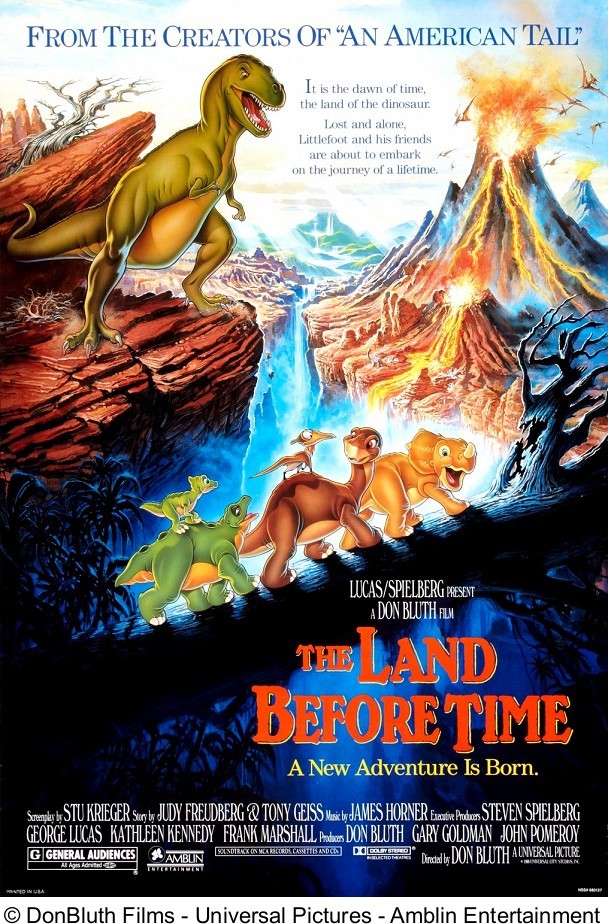 James started to play the melody on the piano beautifully, with a lot of flare and complex multiple notes. Then, Barry interrupted and said, "Let's keep it simple…" Leaning over James' shoulder he said, "…sort of like this.", then with his index finger played the first five notes of the melody one note at a time. The moment reminded us of Antonio Salieri's critical comment about Mozart's music in the film Amadeus: "Too many notes". Everyone had a good laugh, including James. James took over and Cynthia sang the song. The song won everyone's praise, and Steven commented that he thought it will be a hit song – and it was! James used that song's melody throughout the film. When we arrived at Abbey Road on the day of recording, Don and I decided to sit in with the orchestra, instead of observing from the control booth. We sat behind the two harpists. Strange, what the musicians talk about. You would think that they would be thinking in terms of in their musicianship and discussing their performance and the magic of James' score. However, during the moments between rehearsals they talked about remodeling their bathrooms and kitchens, and the difficulties they were having with their building contractors. Perhaps their daily occupation as studio musicians was just a job…not a passion. At one point the two harpists turned back to us and asked Don to sign their copies of a harp book that Don's uncle had written years ago and Don had illustrated when he was just 16 years old. Don had forgotten all about illustrating it. It was a nice surprise.
James started to play the melody on the piano beautifully, with a lot of flare and complex multiple notes. Then, Barry interrupted and said, "Let's keep it simple…" Leaning over James' shoulder he said, "…sort of like this.", then with his index finger played the first five notes of the melody one note at a time. The moment reminded us of Antonio Salieri's critical comment about Mozart's music in the film Amadeus: "Too many notes". Everyone had a good laugh, including James. James took over and Cynthia sang the song. The song won everyone's praise, and Steven commented that he thought it will be a hit song – and it was! James used that song's melody throughout the film. When we arrived at Abbey Road on the day of recording, Don and I decided to sit in with the orchestra, instead of observing from the control booth. We sat behind the two harpists. Strange, what the musicians talk about. You would think that they would be thinking in terms of in their musicianship and discussing their performance and the magic of James' score. However, during the moments between rehearsals they talked about remodeling their bathrooms and kitchens, and the difficulties they were having with their building contractors. Perhaps their daily occupation as studio musicians was just a job…not a passion. At one point the two harpists turned back to us and asked Don to sign their copies of a harp book that Don's uncle had written years ago and Don had illustrated when he was just 16 years old. Don had forgotten all about illustrating it. It was a nice surprise.

Don Bluth: I have not followed his career, but I'm aware of many of his scores from seeing the films either in the theater or on Academy screeners that we receive each year for Academy Award nominations and voting purposes. He just keeps getting better.




